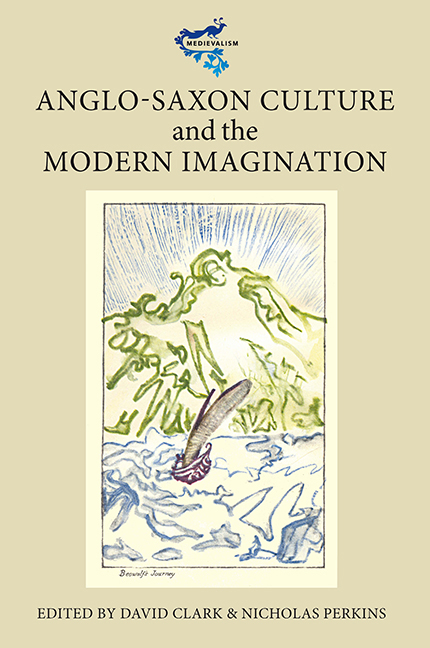Book contents
- Frontmatter
- Contents
- List of Illustrations
- Contributors
- Foreword
- Acknowledgements
- Abbreviations
- Introduction
- 1 From Heorot to Hollywood: Beowulf in its Third Millennium
- 2 Priming the Poets: The Making of Henry Sweet's Anglo-Saxon Reader
- 3 Owed to Both Sides: W.H. Auden's double debt to the literature of the North
- 4 Writing for an Anglo-Saxon Audience in the Twentieth Century: J.R.R. Tolkien's Old English Chronicles
- 5 ‘Wounded men and wounded trees’: David Jones and the Anglo-Saxon Culture Tangle
- 6 Basil Bunting, Briggflatts, Lindisfarne, and Anglo-Saxon Interlace
- 7 BOOO Seeing Beowulf in Pictures and Print
- 8 Window in the Wall: Looking for Grand Opera in John Gardner's Grendel
- 9 Re-placing Masculinity: The DC Comics Beowulf Series and its Context, 1975–6
- 10 P.D. James Reads Beowulf
- 11 Ban Welondes: Wayland Smith in Popular Culture
- 12 ‘Overlord of the M5’: The Superlative Structure of Sovereignty in Geoffrey Hill's Mercian Hymns
- 13 The Absent Anglo-Saxon Past in Ted Hughes's Elmet
- 14 Resurrecting Saxon Things: Peter Reading, ‘species decline’, and Old English Poetry
- Index
5 - ‘Wounded men and wounded trees’: David Jones and the Anglo-Saxon Culture Tangle
Published online by Cambridge University Press: 20 April 2017
- Frontmatter
- Contents
- List of Illustrations
- Contributors
- Foreword
- Acknowledgements
- Abbreviations
- Introduction
- 1 From Heorot to Hollywood: Beowulf in its Third Millennium
- 2 Priming the Poets: The Making of Henry Sweet's Anglo-Saxon Reader
- 3 Owed to Both Sides: W.H. Auden's double debt to the literature of the North
- 4 Writing for an Anglo-Saxon Audience in the Twentieth Century: J.R.R. Tolkien's Old English Chronicles
- 5 ‘Wounded men and wounded trees’: David Jones and the Anglo-Saxon Culture Tangle
- 6 Basil Bunting, Briggflatts, Lindisfarne, and Anglo-Saxon Interlace
- 7 BOOO Seeing Beowulf in Pictures and Print
- 8 Window in the Wall: Looking for Grand Opera in John Gardner's Grendel
- 9 Re-placing Masculinity: The DC Comics Beowulf Series and its Context, 1975–6
- 10 P.D. James Reads Beowulf
- 11 Ban Welondes: Wayland Smith in Popular Culture
- 12 ‘Overlord of the M5’: The Superlative Structure of Sovereignty in Geoffrey Hill's Mercian Hymns
- 13 The Absent Anglo-Saxon Past in Ted Hughes's Elmet
- 14 Resurrecting Saxon Things: Peter Reading, ‘species decline’, and Old English Poetry
- Index
Summary
In 1937, David Jones published his first long poem, In Parenthesis. It follows the progress of the men of ‘B Company’, members of an Anglo-Welsh battalion, proceeding from their early training towards disaster and death in the final attack on ‘Acid Copse’. The temporal structure of the poem echoes Jones's own experience of war in the years 1915–16, from his arrival in France to his battalion's role in the Somme offensive. Despite this conventional narrative structure, In Parenthesis is in no sense a straightforward memoir. T.S. Eliot placed Jones firmly within a modernist coterie following its publication. In an introductory note on the text, he wrote that ‘The work of David Jones has some affinity with that of James Joyce […] and with the later work of Ezra Pound, and with my own.’ In 1954, W.H. Auden reviewed Jones's second long poem The Anathemata (which had been published in 1952), and argued so strongly for its importance that Jones felt moved to thank him. In response, Auden wrote to him, ‘your work makes me feel very small and madly jealous’. Recognising the technical achievements of Jones's work, the approbation of these fellow writers came also from their awareness and appreciation of its allusive substructure. Old English literature formed a part of what Jones called his ‘materia poetica’ even in his early work, at a time when his knowledge of it was certainly limited. Few critics have discussed at length the place of Old English in Jones's work, choosing to focus on his more obvious debts to Middle English. In a review of 1974 however, Seamus Heaney made a strong case for Jones's use of Anglo-Saxon poetics as a unifying source and motif within his writing, describing Jones's writings as a coherence, a ‘megalithic shape founded on In Parenthesis and raised through The Anathemata’. Heaney placed the distinctively Anglo-Saxon vision of the passion of Christ, The Dream of the Rood, at the centre of Jones's poetics. There, he writes, ‘God bleeds as a maimed god at the centre of the world, on the “tump” of Calvary, on a tree.’
Jones's Catholic faith gives his later work its thematic coherence, and also its redemptive vision. In The Anathemata, the life of Christ makes sense of and redeems all human history and creation, and The Dream of the Rood becomes emblematic.
- Type
- Chapter
- Information
- Anglo-Saxon Culture and the Modern Imagination , pp. 89 - 110Publisher: Boydell & BrewerPrint publication year: 2010



